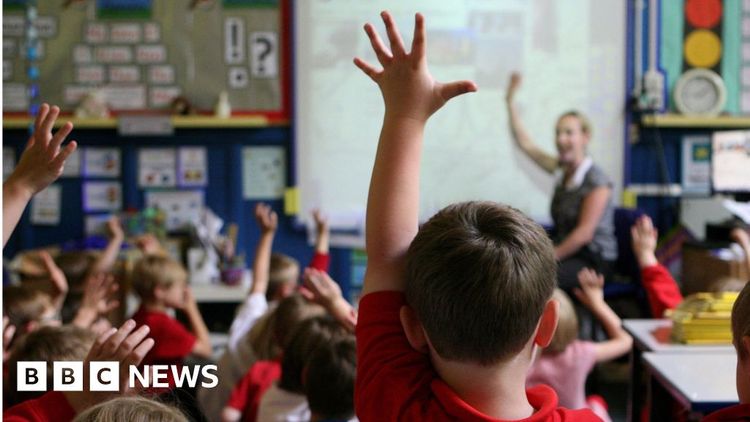Teachers do not have to strike to get attention - education secretary

WATCH: What do the teachers' strikes in England and Wales mean for parents?
By Charley Adams & Hazel Shearing
BBC News
Teachers do not need to go on strike to get "attention", the education secretary has said.
Teaching union the National Education Union (NEU) voted to strike over pay in England and Wales on seven dates in February and March.
Gillian Keegan said the vote was disappointing and the government was trying to tackle inflation.
National strikes are scheduled for 1 February, 15 and 16 March, with regional ones on other days.
Speaking to BBC Breakfast Ms Keegan said: "You don't have to strike to get a meeting with me, to get attention from me.
"And I'm very interested in supporting teachers, they do a fantastic job - they really are changing lives every day."
She said changes had been made to tackle recruitment and retention challenges within the teaching profession, including providing more support for teachers in their first few years.
Ms Keegan said the "key problem" was inflation and the government was working to halve it this year.
Head teachers are being asked to keep "as many schools open for as many children as possible," Ms Keegan said in a separate interview on BBC Radio 4's Today programme.
"But if they need to prioritise, to prioritise vulnerable children, exam cohorts and also children of critical workers."
Are you a teacher who'll be going on strike?
Kevin Courtney, joint general secretary of the NEU said there "comes a time when it's important to stand up for yourself".
He said the ballot result was the "biggest union result since thresholds have come in".
Speaking on BBC Breakfast, Mr Courtney said some teachers had left the profession to work in supermarkets and children were learning subjects from textbooks.
He said he was pleased talks were happening between unions and the government and another meeting was scheduled for Wednesday.
When are NEU teachers striking?
Teacher strikes will happen both nationally and regionally, in schools as well as sixth-form colleges.
Action will take place on the following days:
The NEU says any individual school will only be affected on a maximum of four out of the seven dates.
Most state school teachers in England and Wales had a 5% pay increase in 2022.
But the NEU says this rise actually equates to a pay cut, because of high inflation rates.
Meanwhile, head teachers will not strike in England after a ballot by the National Association of Head Teachers (NAHT) union failed to meet the legally-required 50% turnout threshold.
The union says it is considering re-running the ballot because of alleged disruption caused by postal strikes.
NAHT members in Wales will take industrial action, however, after the ballot there met the required turnout.
Paul Whiteman, general secretary for the NAHT, said the union might run a ballot again to "make sure voices of NAHT's members are heard".
He told BBC Radio 4's Today programme that there had been a "hardening of attitudes" and the dispute had been "coming for years".
Support staff in England and Wales also voted in favour of striking but in England they failed to meet the legal threshold so will not be taking part.
The NASUWT union reported a 42% turnout last week - below the threshold needed for lawful strike action.
NASUWT members, as well as those of other unions, have already been on strike in Scotland.
Teachers from five unions in Northern Ireland are continuing to take action short of a strike - affecting meeting attendance and administrative tasks.
Related Topics




















































